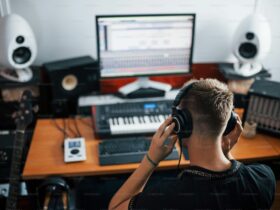With advancements in technology and more devices being available for purchase at an affordable price point, setting up a home recording studio has become easier than ever.
Whether you are looking to break into the music industry or just want to record yourself singing songs as a hobby – this article will show you how you can soundtrack your dreams on a budget.
From buying equipment to finding free software solutions – we’ll walk through all of the steps needed to get your very own project studio started and help make sure that it meets both your budget and technical specs.
Identify the type of recording setup you want – acoustic or electronic
Deciding whether to set up an acoustic or electronic home recording studio is an important and fundamental decision.
With an acoustic studio, you can capture the natural warmth and resonance of real instruments and vocals, although such studios are often more expensive to set up and require a more time-consuming microphone setup process.
An electronic studio enables you to work quickly and efficiently, but it tends to be more limited in terms of sound quality than an acoustic studio.
Consider how you want the end result to sound, as well as how much time and money you want to commit when deciding which type of recording setup is right for you.
Gather the essential equipment needed for a home recording studio: computer, audio interface, microphone, and headphones
With just a few essential pieces of gear – like a computer, microphone, audio interface, and headphones – you can start creating music right away.
Your computer will serve as the foundation, allowing you to record and manipulate digital audio files.
An audio interface connects your microphone and other devices to your computer so you can transfer sound directly into it.
To capture the highest quality recordings, choose a good-quality microphone and invest in a set of noise-canceling headphones so that all the nuances of sound are captured faithfully.
When it comes down to it, these four items are really all you need for a basic home recording studio setup.
Shop around for the best deals on equipment, focusing on both quality and affordability
When setting up a home recording studio on a budget, it is important to shop around for the best deals in order to maximize both quality and affordability.
Researching sound equipment before you buy can not only save you money in the long run but can also ensure that you are getting the best possible selection for your needs.
Comparison shopping at different stores and online outlets may reveal prices that are significantly lower than initially discovered.
Another tactic when looking for affordable studio equipment is to look for used items from pawn shops, antique stores, and auction sites such as eBay.
Utilize free recording software and build a library of sounds for your recordings
There are plenty of great free programs available that provide the basics of high-quality digital sound capturing. Additionally, there are a variety of free options when building a library of sounds and effects available online if you know where to look.
By doing some research online and with more experienced producers, you can put together an arsenal of sounds for your mixes without having to invest in any external hardware.
Though this will require time investment as you find out what works for your project and overall sound, by utilizing these resources, it is possible to have a high-level home studio on a budget.
READ MORE – Benefits Of Studying While Listening To Music
Invest in soundproofing materials to reduce noise in the recording space
One of the most effective ways to reduce costs and still get quality sound is to invest in soundproofing materials for your recording space.
From acoustical foam panels to bass traps, there are many low-cost options, so you don’t need to break the bank. Soundproofing materials help absorb sound and reduce outside noise entering your recording area, allowing you to capture higher-fidelity recordings.
Don’t skimp on this important step; investing in soundproofing materials can be one of the best decisions you make for getting the highest possible quality recordings in your home studio!




